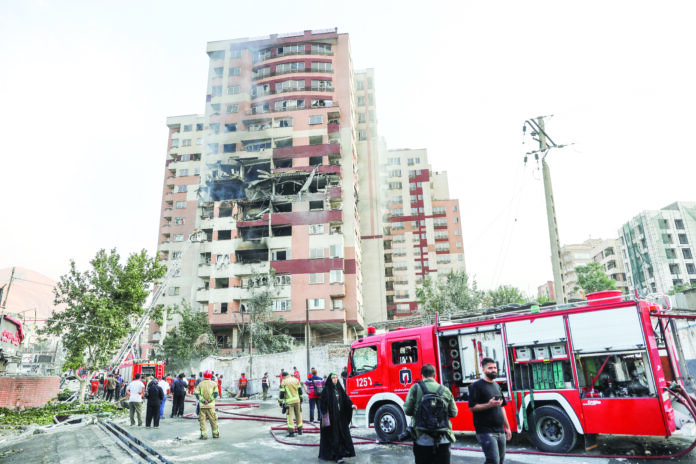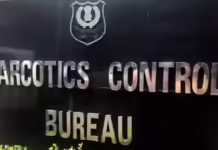
Degradation of Iran’s nuclear capabilities may take several weeks.
NEW DELHI: As Iran fires waves of ballistic missiles at Israel on the second day of the war on Saturday, in retaliation to Israel’s attack on its military installations on Friday—attacks that are ongoing—experts in Tel Aviv say that their Operation Rising Lion is likely to continue for quite some time. Israel is going not only for a decapitation operation where the top military brass as well as the scientific leadership of Iran’s missiles and nuclear programs are eliminated, but also a complete degradation—if possible, elimination—of Iran’s nuclear and missile capabilities, which may take several weeks, because the facilities are spread all over Iran, which is a big country. This comes in the backdrop of the announcement made by the Israel Defense Forces (IDF) on Saturday that they have “established aerial freedom of operation in western Iran, up to Tehran… Tehran is no longer immune—Iran’s capital is now exposed to Israeli strikes.”
Experts say that Israel went for an all-out war at this juncture as it had credible information that Iran had started getting the capability to deliver a nuclear weapon. According to the Israelis, Iran had speeded up its uranium enrichment program after the defanging of the Hezbollah in Lebanon from September 2024 onwards, and the subsequent fall of Bashar Al-Assad in Syria in December—both Iranian proxies that were being used by Tehran against Israel. Shorn of its other proxy, the terrorist group Hamas, Iran started losing its ability to use terror as an instrument of state policy against Israel, making it speed up its nuclear program. Adding to Iran’s insecurity was the Israeli operation that carried out precise and controlled airstrikes on Iran’s military installations on the intervening night of 25-26 October. This came after Iran’s 1 October ballistic missile attack—when around 180 missiles were fired—on Israel after the latter eliminated Hezbollah leader Hasan Nasrallah on 27 September. At the time itself it became clear that Iran did not have the wherewithal to stop Israeli strikes, as Israel effortlessly took out Iran’s air defence systems, including the Russian S-300s, apart from attacking IRGC (Islamic Revolutionary Guard Corps) missile and other military bases. Iran was a sitting duck faced with the Israeli assault. Then Donald Trump, after becoming US President earlier this year, initiated indirect talks with Iran. Five rounds of talks had taken place, with the sixth round scheduled for Sunday, which now stands cancelled by Iran. Trump wanted Iran to halt uranium enrichment and dismantle its nuclear facilities, but Iran wanted to keep enriching uranium for civilian purposes, which Israel was opposed to.
The immediate trigger for the war was the recent report by the IAEA, that said that Iran was carrying out secret nuclear activities. “The Agency concludes that Iran did not declare nuclear material and nuclear-related activities at three undeclared locations in Iran, specifically, Lavisan-Shian, Varamin, and Turquzabad,” the report said. A separate IAEA report added that Iran’s stockpile of uranium enriched up to 60% purity—90% makes it weapons grade—had grown to 408.6 kg, from 274.8 kg in February in just three months. According to the IAEA, if Iran continued at this pace, it would soon get the capability to deliver nine nuclear weapons.
U.S. INVOLVEMENT
Israeli experts say that there were four possibilities: a) Israel would attack Iran alone; b) it would work independently but in coordination with the United States; c) it would be an Israel-US joint military operation; d) the US would attack Iran on its own. When Israel planned the attack, it took into consideration all these four options. What is unfolding right now is option b), where Israel is working independently, but is in full coordination with the US. This was made public by Prime Minister Benjamin Netanyahu as well on Saturday.
Israelis say that the US was also given prior notice about the operation. But whether or not the attack becomes a joint operation between Israel and the US, will depend on how far Iran is willing to escalate the war. The US’s primary concern is the around 40,000 American troops stationed in the Middle East. Any attack on US interests in the region by Iran, is bound to drag the US into the war.
ISRAEL’S TARGETS
The experts add that for Israel, neutralising Iran’s ballistic missile program is its immediate priority. The Joint Comprehensive Plan of Action (JCPOA), signed in 2015—during the Obama administration—to limit Iran’s nuclear program, did not cover ballistic missiles. Eventually, Trump walked out of JCPOA during his first term. Ballistic missiles have the capability to carry several hundreds of kilograms of explosives, including nuclear payloads, over long distances. Iran has been using ballistic missiles heavily against Israel, often targeting civilians. Worryingly for Israel, Iran has an inventory of “thousands of ballistic missiles”, and has been producing 40-50 a month. In fact, Iran is suspected to have transferred some ballistic missiles earlier to the Hezbollah as well as to the Houthis. The latter keep firing these missiles at Israel periodically.
Among other military targets are the “dozens of Iranian commanders” that Israel has taken out—right from the top, from General Hossein Salami, Commander-in-Chief of the IRGC, and Major General Mohammad Bagheri, Chief of Staff of the Iranian Armed Forces—who was also the second-highest military official after Supreme Leader Ayatollah Ali Khamenei—to General Amir Ali Hajizadeh, who was head of the IRGC’s Aerospace Force and missile program, as well as several others. Israel has also taken out several nuclear scientists who were working on the Iranian bomb.
This is a classic “decapitation operation” that Israel is becoming famous for, as this is exactly how they took out layers of Hezbollah’s senior leadership last year in September-October. The attacks on Iran are pin-pointed—so precise that drones carrying explosives have been destroying single penthouses in residential high-rise buildings, while leaving the other apartments intact.
Among other military targets have been Iran’s air defence systems. Reports are that Mossad had set up a covert base inside Iran, from where drones and other precision weapons were launched to disable Iran’s air defence systems, thus freeing up Iran’s skies for Israel’s fighter jets. It must be mentioned here that after the destruction of its S-300 batteries in the 26-27 October attack, Iran had placed orders with Russia to either buy new air defence systems or to repair what had been damaged. Russia is yet to deliver these. And as a military expert told this writer last year, the delivery/repair process may take over two years.
Iran’s drone launch sites also have been hit, as well as military bases and command centres in Tehran, Qom, and other provinces.
And then there are the nuclear facilities that Israel has been bombing at will, including at Natanz, Fordow, Khondab, Khorramabad and Parchin, of which Natanz and Fordow are of critical importance to Iran. Natanz has Iran’s largest enrichment facility and houses thousands of centrifuges. Iran has admitted to limited damage to this facility, while Israel and IAEA say the damage is extensive.
NO ECONOMIC TARGETS, YET
Israel is avoiding targeting economic facilities—Iran’s oil and gas installations to be precise. As this writer had reported last year, the US had been opposed to Israel attacking any such target as that had the potential to derail oil and gas supplies worldwide. The US was also opposed to Israel attacking Iran’s nuclear facilities, but this time, the nuclear facilities are on Israel’s crosshairs. Israeli experts say that whether, or not, Israel attacks these economic targets, will depend on Iran’s capability and willingness to escalate the war. Israel is also avoiding targeting civilians, while it says that Iran’s ballistic missiles are directed at its civilians, as the missile hits on residential buildings and neighbourhoods prove. Iran has been launching hundreds of ballistic missiles in every wave, in the hope of overwhelming Israel’s air defence systems, which, like India’s are multi-layered. While most of these Iranian missiles are being intercepted, a handful have been going through. As an Iranian commentator based in Israel had told this writer last year, “Iran launches hundreds of missiles, but lacks the precision to ensure their delivery at the designated targets”. As American professor of strategy and statecraft at the University of Florida, Walter Russell Mead, posted on X: “Iran had long anticipated an Israeli attack and had plenty of time to plan. That its response was as ineffectual and poorly orchestrated as last night’s suggests both that Israel’s initial strikes were enormously successful and that Iran’s strategic planning is overrated.” But Israelis are not underestimating their enemy, as even if 8-9 missiles out of the 200 launched by Iran hit their targets, or nearby areas, these may cause devastation to the civilian population—and this in spite of nearly the whole country going into bomb shelters at the first sign of trouble.
THE NEIGHBOURS
Israelis say that Operation Rising Lion is proof of the many years of intelligence work and detailed planning that have gone into the attack. Also, weapons needed to penetrate 45-80-metres of concrete at the nuclear facilities are helping. Iran cannot match this in any manner. In fact, so severe is the mismatch, that Iran has been majorly dependent on terrorist proxies against Israel. But now the proxies are also falling silent. Hezbollah, or whatever remains of it, has been asked by the Lebanese government to stay out of the war and seems to be listening. The Houthi attacks are muted. Israel has free movement over Syrian airspace. Those in the know say there is active cooperation between Israel and the Arab states in intercepting explosive drones and ballistic missiles. Sources say that the Gulf states, including Saudi Arabia, are secretly delighted that Israel is taking out Iran’s military infrastructure. But the Arab world is also worried about the possibility of Iran launching attacks on them. They are particularly wary of Iran attacking oil traffic in the Strait of Hormuz, for that will mean wider war in the region.
CIVILIAN POPULATION
Israeli experts say that while the mood in Israel is sombre and cautious, the civilian population is behind the government, specifically Prime Minister Benjamin Netanyahu, in this war. Tired of Iran’s constant hostility, they want Iran’s clerical regime neutralised. But Israel understands that even if it degrades Iran’s war fighting capabilities, it will ultimately depend on Iran’s own people to topple the regime. There is widespread anger against the regime, which is facing protests almost every week. There was a truck drivers’ protest last week, a nurses’ protest the week before that. Cost of living is extremely high in Iran. The moral police rules with an iron hand. The anger is spreading to the rural interiors. But if that is enough to pose an immediate threat to the clerics, is not known. Hence, a regime change is unlikely to happen organically, yet, say Israeli analysts.
CHINESE HAND?
Israel has also started speaking of the “unseen” Chinese hand behind Iran. Apparently, a lot of Chinese help has started coming to Iran for its ballistic missile program, which is making the Israelis wary of Beijing’s intentions.
NEW MIDDLE EAST?
Israelis say their aim is to degrade Iranian military capabilities to the extent that the latter find it near impossible to restart their nuclear program in the foreseeable future. Of course, Iran may always try to revive its nuclear program, but Israel is optimistic. “Iran is reaching the point of no return. We couldn’t afford to delay the action. By crippling Iran’s nuclear capabilities, we hope we will see a new Middle East. Israelis are optimists by nature. Iran is a global threat. The world cannot afford a nuclear Iran, led by this horrific regime, which glorifies murder and death and those kind of ‘values’,” says an expert.







